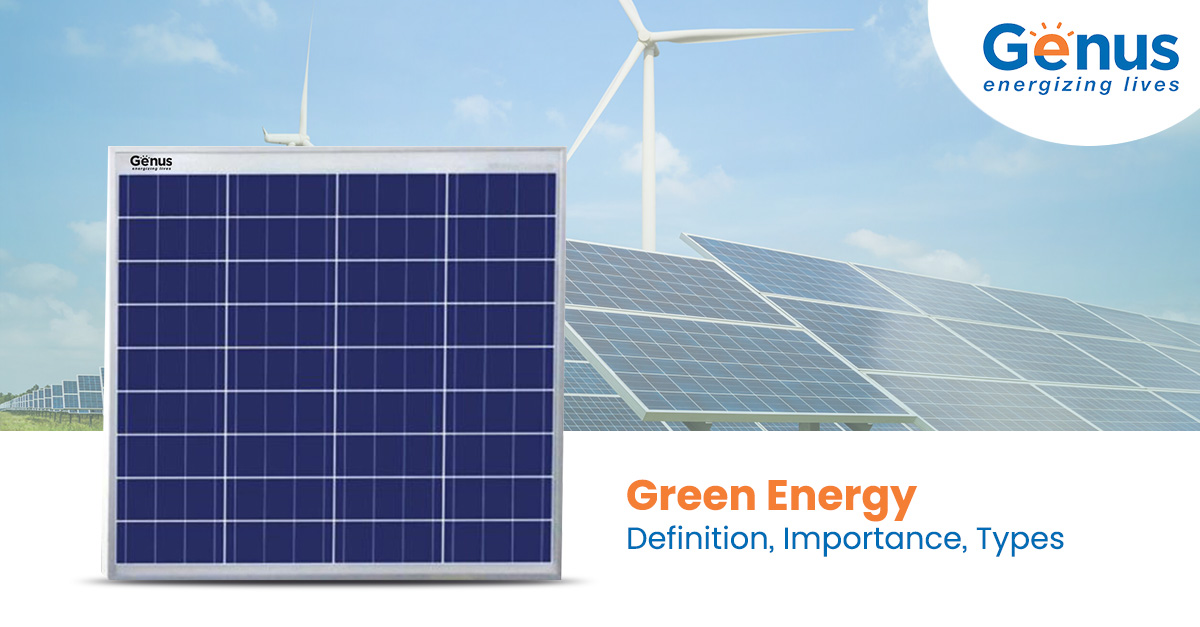What is Green Energy?
Green energy, also known as green power, is a form of energy derived from natural resources like sunlight, water, or wind. These sources are renewable and environmentally friendly, producing minimal or no greenhouse gas emissions. Genus champions the use of green power, offering efficient solar products for homes that prioritize climate protection.
Environmental Impact of Green Energy:
Green power plays a pivotal role in environmental conservation for several reasons:
- Replacement of Fossil Fuels:
Green energy substitutes the detrimental effects of fossil fuels with cleaner alternatives like wind, water, and sunlight. These resources are renewable and pose fewer environmental risks.
- Reduced Greenhouse Gas Emissions:
Throughout their life cycle, green energy sources emit minimal greenhouse gases, mitigating pollution and environmental damage. This contributes to a sustainable planet.
- Cost-Effective and Stable:
Locally produced green energy sources are cost-effective and stable. They remain unaffected by price fluctuations, geographical crises, or supply-chain disruptions. Genus inverter batteries are designed for prolonged electricity supply, making them ideal for areas with frequent power outages.
- Economic Benefits and Job Creation:
The shift to renewable energy, as of 2018, has generated 11 million jobs globally (source: TWI Global). This not only provides economic benefits but also contributes to job creation.
- Resilient Energy Infrastructure:
Green energy, sourced from wind and solar power, fosters resilient energy infrastructure less reliant on centralized sources. This resilience reduces susceptibility to disruptions and weather-related climate change.
- Affordable Energy Solutions Globally:
Green power offers a low-cost solution to diverse global energy needs, ensuring accessibility and affordability.
Types of Green Energy:
Various types of green energy originate from different natural sources:
- Solar Energy:
Derived directly from the sun, solar energy is harnessed through photovoltaic cells. Genus solar systems for homes effectively convert sunlight into usable electrical power, promoting energy efficiency. - Wind Energy:
Powered by the sun, wind energy is generated through the uneven heating of the atmosphere, resulting in wind currents. Genus solar tubular batteries complement wind energy solutions, offering extended service life for uninterrupted power backup. - Hydroelectric Energy:
Capturing energy from flowing water, hydroelectric power utilizes dams or reservoirs to enhance energy per square meter. This versatile and efficient green energy form is suitable for both large and small-scale projects. - Biogas:
Produced from organic waste decomposition, biogas includes methane generated from materials like food, sewage, and agricultural waste. Genus inverter batteries ensure a consistent power supply, aligning with green energy practices. - Biomass:
Derived from recently living organisms and plants, biomass contains solar-derived energy. While biomass burning emits greenhouse gases, it remains a cleaner alternative compared to fossil fuels.
Green Energy vs. Renewable Energy:
While often used interchangeably, there is a nuanced difference between “green energy” and “renewable energy.” Green energy specifically originates from natural sources like the sun, making it a subset of renewable energy. All resources for green power are renewable, emphasizing greater environmental benefits.
In conclusion, Genus, a leading manufacturer of eco-friendly solar power products, offers innovative solutions for homes and businesses. By embracing green energy, you contribute to a sustainable future. Connect with Genus to make your home or office space energy-efficient and environmentally conscious.
Reduced Energy Loss in Transport
Traditional energy transport involves increasing voltage and reducing current to minimize electricity loss during long-distance distribution. Installing panels at individual homes and rooftops can significantly reduce the overall distance, lowering energy loss during transportation and enhancing the efficiency of the electrical system.
Environmental and Economic Impact
Solar energy production is renowned for its environmental friendliness, utilizing a renewable energy source without producing greenhouse gases or air pollution. Beyond this, solar panels contribute to a quieter environment by generating no noise pollution. They absorb sunlight, keeping structures cooler and reducing the need for air conditioning. With zero waste generation and durability against extreme weather conditions, solar panels exhibit a prolonged lifespan, minimizing the need for replacements or new purchases.
Diverse Applications Beyond Electricity Generation
In addition to powering homes and businesses, solar panels find diverse applications, including generating heat for water heaters in residential and commercial spaces. They are also utilized for water distillation in remote areas with limited clean water access and serve as the primary source of electricity for satellites in space.
These lesser-known advantages of solar cells underscore the compelling reasons to invest in solar energy. Find out about the eco-friendly products offered.
Subscribe to our free newsletter
Stay in the loop! Subscribe to our newsletter for the latest updates, exclusive content, and exciting offers.
*By subscribing to our newsletter you agree to our Privacy Policy.






